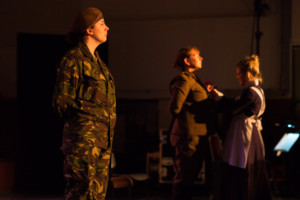EDINBURGH 2019: DEAD EQUAL Q&A

BWW catches up with Lila Palmer, writer of Dead Equal, to chat about bringing the opera to the 2019 Edinburgh Festival Fringe.
Tell us a bit about Dead Equal.
Dead Equal is a new opera revealing the untold stories of British women in combat across time, created in partnership with serving female military.
Why choose opera as the format for this show?
Opera is traditionally about sex and death: usually a woman is in trouble and doesn't make it to curtain call! It's also traditionally been white, posh and heteronormative (as far as the storytelling goes). The special thing about opera is BIG primal, unamplified sound carrying big themes: passion, love, sacrifice. In the past those narratives have been destructive to women. We felt this story had all those big emotions, but women are driving the narrative, leading from the front, in charge of their lives and their story. Pretty much all my work is about finding what's great in the opera tradition and challenging what is not. I just don't think you should say the word 'opera' and go 'so how does she die?' We don't need that fetish in the form.
Why is it important to tell this story?
I think women, queer people, people of colour need to see stories which do not cast them as secondary or expendable. That place them in the lead. Because it makes us braver in our own lives to see ourselves. And I think the women who have and continue to serve in the military deserve to be celebrated in our culture. Whatever your perspective on that job, here are women in leadership, empowered and in charge. They're just been too busy getting on with the job to share their stories. We need to know they exist because it makes all of us bolder.
Why is it particularly relevant now?
When women were allowed into full combat roles in the British army in 2016, there was a lot of public and press resistance to the idea of women fighting. That's when we started writing this show. This year those women are operational. As I researched other militaries going 'fully co-ed' all the information indicated that before they were officially combat troops, women were already were in combat, being wounded, getting killed, and yes, killing, but because they weren't officially in that role were not getting pay or promotion reflecting that service. And I thought, I bet you that's true in the UK too. And interviewing these female soldiers in the UK, turns out it was true. So the argument of women in combat being new, it just wasn't a thing. And when you realise this incredible British woman was decorated for valour back in WWI was infantry and then a decorated cavalry officer, it really did seem absurd.
So it's relevant now because it's time to recognise what IS. Why? I think, it's a tremendous relief for women to know they have powerful forebears. They don't have to be the first in. That's a lot of weight to carry. We have to catch up with them.
What do you hope audiences take away from the show?
Flora, the World War I veteran, has statues dedicated to her in Serbia. She should be taught on school history syllabi in the UK. Her name should be known in her own country. Emily her best friend, who saved thousands of lives in that same war, went to a neglected grave in California, never rewarded anywhere. So I'd like them to be remembered. But Jo, our contemporary character, who reflects all of that testimony from these incredible women who are in the portrait exhibition, who really are the best of us- they are so strong in every sense, and tender and thoughtful and smart - I suppose I want little girls to see these superhero women. And know they can do anything they put their minds to.
https://tickets.edfringe.com/whats-on/dead-equal
Photo credit: Nick Rutter
Sponsored content
Comments
Videos

